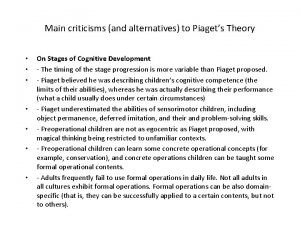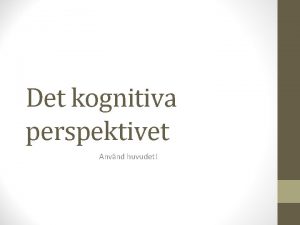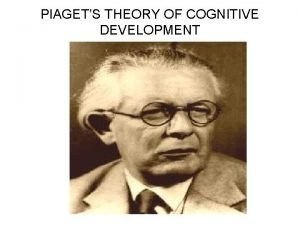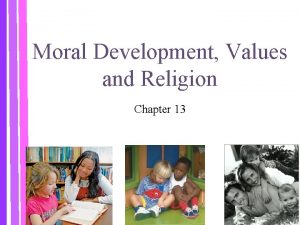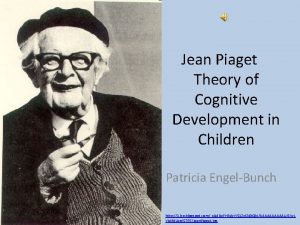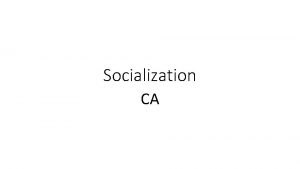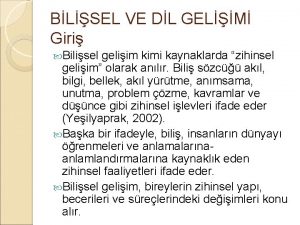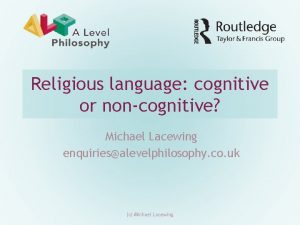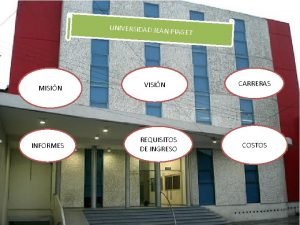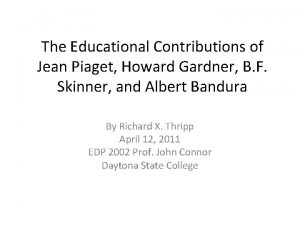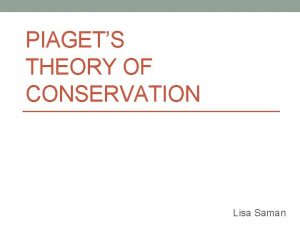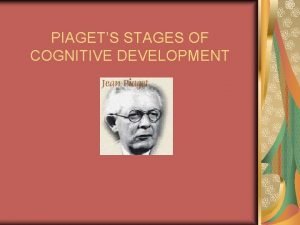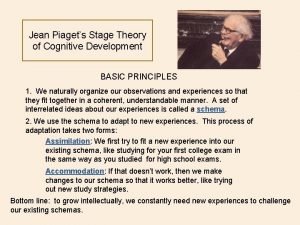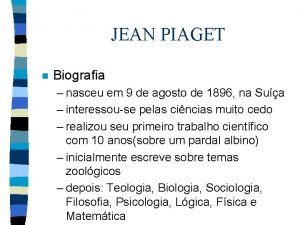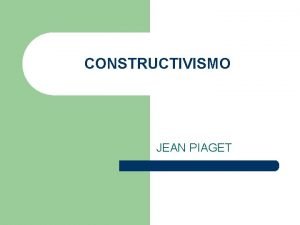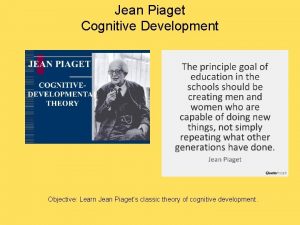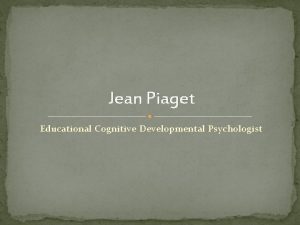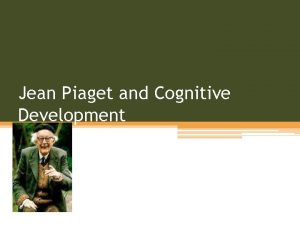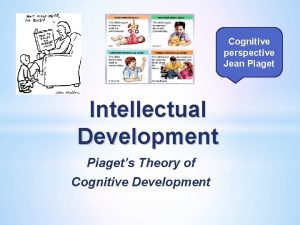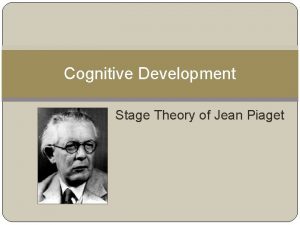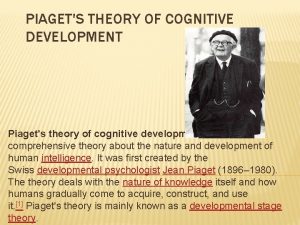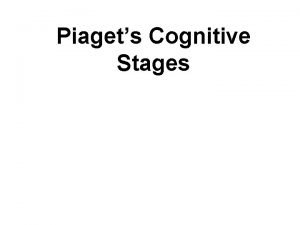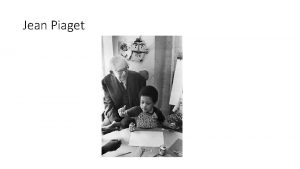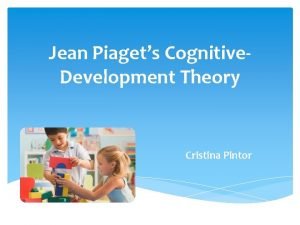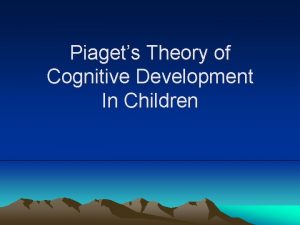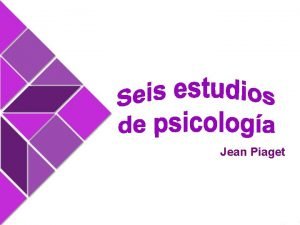JEAN PIAGET COGNITIVEDEVELOPMENTAL THEORY Piagets Theory of Cognitive


















- Slides: 18

JEAN PIAGET COGNITIVEDEVELOPMENTAL THEORY

Piaget’s Theory of Cognitive Development w Stage Theorist – 4 stages of cognitive development w Developed primarily as a result of observing his own children, and as such… w Deemed unscientific by many American psychologists, but…. w Results have since been replicated by many attempting to discredit his work

Piaget’s Theory of Cognitive Development: Basic Concepts w Physical action/curiosity/exploration is the basis for cognitive development w Adaptation – a continuous process of interacting with the environment, leads to the development of schemas w Schema – a habit, reflex or response; may be behavioral or cognitive w Assimilation – using an existing schema to handle an environmental demand

Piaget’s Theory of Cognitive Development: Basic Concepts w Disequilibrium – conflict created when new situations can not be assimilated (i. e. an existing schema is unable to handle an environmental demand); leads to…. . w Accomodation – modifying a response in accordance with environmental demands; leads to new schema development (this is cognitive growth) w Equilibration Principle – disequilibrium leads to curiosity and exploration which facilitates cognitive development w Figurative vs. Operative Knowledge

TO MAINTAIN EQUILIBRIUM, individuals ADAPT to their environment and ORGANIZE their knowledge ADAPTATION AND ORGANIZATION are essential to EQUILIBRATION The process of maintaining equilibrium

COGNITIVE ABILITIES DEVELOP IN STAGES

STAGES OF COGNITIVE DEVELOPMENT SENSORIMOTOR PREOPERATIONAL CONCRETE OPERATIONS FORMAL OPERATIONS

STAGES OF COGNITIVE DEVELOPMENT SENSORIMOTOR

Piaget’s Theory of Cognitive Development: Sensorimotor Stage w Birth – 2 yrs of age w Schema development is largely sensory and motor related w Reflexive behavior dominates stage (ex. Sucking) w Eye-hand coordination develops w Demonstrates: intentionality w object differentiation w object permanence

PREOPERATIONAL STAGE IMMACULATE PERCEPTION

Piaget’s Theory of Cognitive Development: Preoperational Stage w Ages 2 – 6 years w Schema development involves speech, language and vocabulary and is characterized by: ocentrism reliance on perception irreversibility centration simple classification inability to “conserve”

CONSERVATION OF LIQUIDS PREOPERATIONAL STAGE

STAGES OF COGNITIVE DEVELOPMENT SENSORIMOTOR PREOPERATIONAL CONCRETE OPERATIONS

Piaget’s Theory of Cognitive Development: Concrete Operations w Ages 6 – 11 yrs. w Ability to reason logically with concrete but not abstract concepts w Characterized by: reversibility w decentration w ability to “conserve” w multiple classification w seriation

STAGES OF COGNITIVE DEVELOPMENT SENSORIMOTOR PREOPERATIONAL CONCRETE OPERATIONS FORMAL OPERATIONS

Piaget’s Theory of Cognitive Development: Formal Operations w w w Early Adolescence and Adulthood w Characterized by: Propositional thinking Experimental reasoning Idealistic Egocentrism Conceptualizes combos

“EVERY TIME WE TEACH A CHILD SOMETHING, WE KEEP HIM FROM REINVENTING IT. ON THE OTHER HAND, EVERY TIME A CHILD DISCOVERS IT FOR HIMSELF, IT REMAINS WITH HIM FOR THE REST OF HIS LIFE. ” Jean Piaget

Piaget’s Theory of Cognitive Development: Implications w Suggests the importance of discovery learning (Bruner) w Suggests that learning will be most meaningful if interest and curiosity is peaked (i. e. induce disequilibrium by presenting challenges just beyond the child’s capabilities w Suggests there are limits to what can be taught to children; learning is limited by stage characteristics
 Criticisms of piagets theory
Criticisms of piagets theory Grundantaganden kognitiv psykologi
Grundantaganden kognitiv psykologi Outline piaget's theory of cognitive development
Outline piaget's theory of cognitive development Piaget theory of cognitive development
Piaget theory of cognitive development Jean piaget theory
Jean piaget theory Jean piaget theory of moral development
Jean piaget theory of moral development Jean piaget daughter
Jean piaget daughter Piaget application
Piaget application Example of anticipatory socialization
Example of anticipatory socialization Piaget ve vygotsky dil gelişim karşılaştırılması
Piaget ve vygotsky dil gelişim karşılaştırılması Cognitive and non cognitive religious language
Cognitive and non cognitive religious language Iaget
Iaget How are howard gardner and jean piaget different?
How are howard gardner and jean piaget different? Piaget water conservation age
Piaget water conservation age Piaget concrete operational stage
Piaget concrete operational stage Jean piaget preoperational stage
Jean piaget preoperational stage Biografia de piaget
Biografia de piaget Sensorimotor experience
Sensorimotor experience Jean piaget (1896-1980)
Jean piaget (1896-1980)
